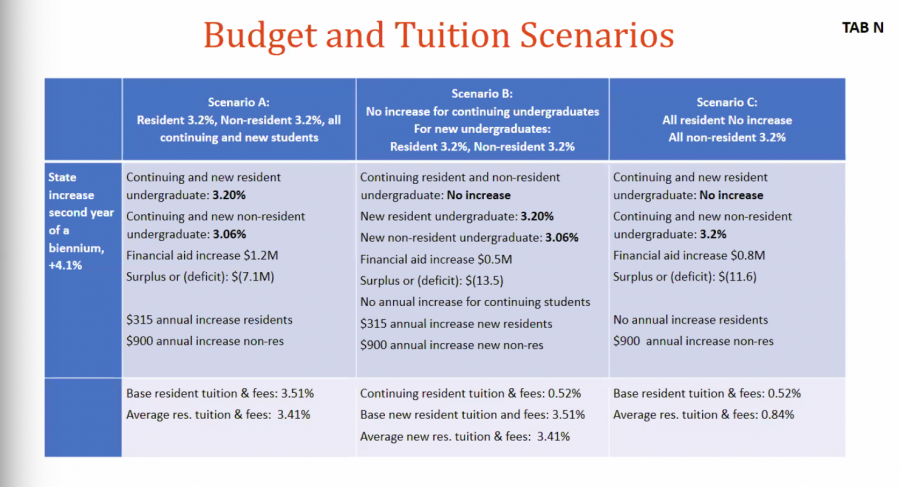Board of Trustees make tuition decisions, vote to move forward on in-house law enforcement
April 4, 2020
The Oregon State University Board of Trustees deliberated and voted on decisions regarding tuition and fees for the 2020-21 school year, reducing student incidental fees for spring 2020 and developing a university in-house police force in an April 3 virtual meeting amid the COVID-19 pandemic.
Mike Green, the vice president for Finance and Administration and chief financial officer, and Sherm Bloomer, the associate vice president of Budget and Resource Planning, presented the Trustees with three tuition, mandatory and student incidental fee rate scenarios for the 2020-21 school year.
Scenario A would increase costs for all continuing and new students, 3.2% for residents and 3.2% for non-residents. Under Scenario B, there would be no increase for continuing undergraduate students, yet new undergraduates—residents and non-residents—would see a 3.2% increase. Scenario C suggested no increase for all resident students, and a 3.2% increase for all non-resident students.
“This is a very different approach to tuition undergraduate recommendations than you’ve seen in the past. This makes a distinction between current and new students,” Bloomer said during Friday’s meeting.
Bloomer discussed the challenges current students are facing, including learning remotely without the traditional on-campus experience.
“Our current students have made a commitment to OSU. Adding a tuition increase for those continuing students could communicate to them that we don’t recognize that changed experience—that we don’t recognize the challenges that they face—and could cause some of them to choose not to come back to OSU,” Bloomer said. “Those continuing students have fewer options than a new student does, because they already made an investment in OSU—they’ve committed time, they’ve committed resources, they’ve committed energy in making progress toward their degree.”
Trustees deliberated between Scenario B and Scenario C, and ultimately voted in favor of Scenario B with 11 votes.
The trustees also approved a resolution to reduce student incidental fees for spring term as a result of the COVID-19 outbreak following public comments from Associated Students of OSU President, Rachel Josephson, Associated Students of Cascades Campus Vice President, Jade Warner, ASOSU Student Fee Committee Chair, Safi Ahmad and ASOSU Vice President, Kylie Boenisch.
“Approving this is a dual help to students, in that it decreases costs for this term, and also doesn’t decrease services,” Josephson said during the meeting.
Spring term student incidental fees will ultimately be reduced from $398.44 to $353.30 on the Corvallis campus and $267 to $111 on the OSU-Cascades campus.
The Trustees also unanimously voted that the university move forward with developing in-house law enforcement, establishing its own police force by July 1, 2020, the date the contractual agreement with Oregon State Police expires. The in-house police force will consist of armed, sworn officers.
“If we garner your approval today on this, we will be moving very quickly in the short time available to recruit, train, hire and equip those officers that we need to conduct law enforcement as a component of our public safety department, and I assure you that officers, when they’re put into service, will be well-trained, and very professional in understanding the values and principles of our campus,” Paul Odenthal, senior associate vice president for administration and co-chair of the Public Safety Advisory Committee, said prior to the Trustees’ vote Friday.
Some Trustees expressed concern that July 1 is too close a deadline to effectively develop the university’s in-house police force.
“We understand that the first of July is rapidly approaching, and as we build this organization, we understand that we’re going to need assistance and mutual aid agreements with other agencies—one, to provide special capabilities, but also to help us with large events and depth of service, and we will continue to pursue those with other local agencies for their assistance,” Odenthal said in Friday’s meeting.
Following Friday’s meeting, Green said he was pleased with the Board of Trustees’ decisions.
“I was very pleased that the board agreed to freeze tuition for continuing students and that the board agreed to review in May the prospect of tuition relief for new students. I was also pleased with the board’s approval with respect to law enforcement on campus,” Green said via email. “The university is committed to continue to place the safety of the university community first and foremost, by taking steps to blend public safety and policing services on the Corvallis campus.”
The Board of Trustees will convene for their next meeting in late May.
























































































































